Moderate Communitarianism and Its Ambivalence
VerifiedAdded on 2023/04/25
|5
|1100
|162
AI Summary
This essay explores the concept of Moderate Communitarianism (MC) and its ambivalence towards individual rights and social responsibility. The author argues that Gyekye's notion of MC is a blend of both unrestricted and restricted forms of communitarianism, where the communal will takes precedence over individual rights. The recognition of individual rights is just for the sake of the community, making the individual a passive container of collective will. The paper concludes that Gyekye is not the moderate communitarian as he claims to be.
Contribute Materials
Your contribution can guide someone’s learning journey. Share your
documents today.
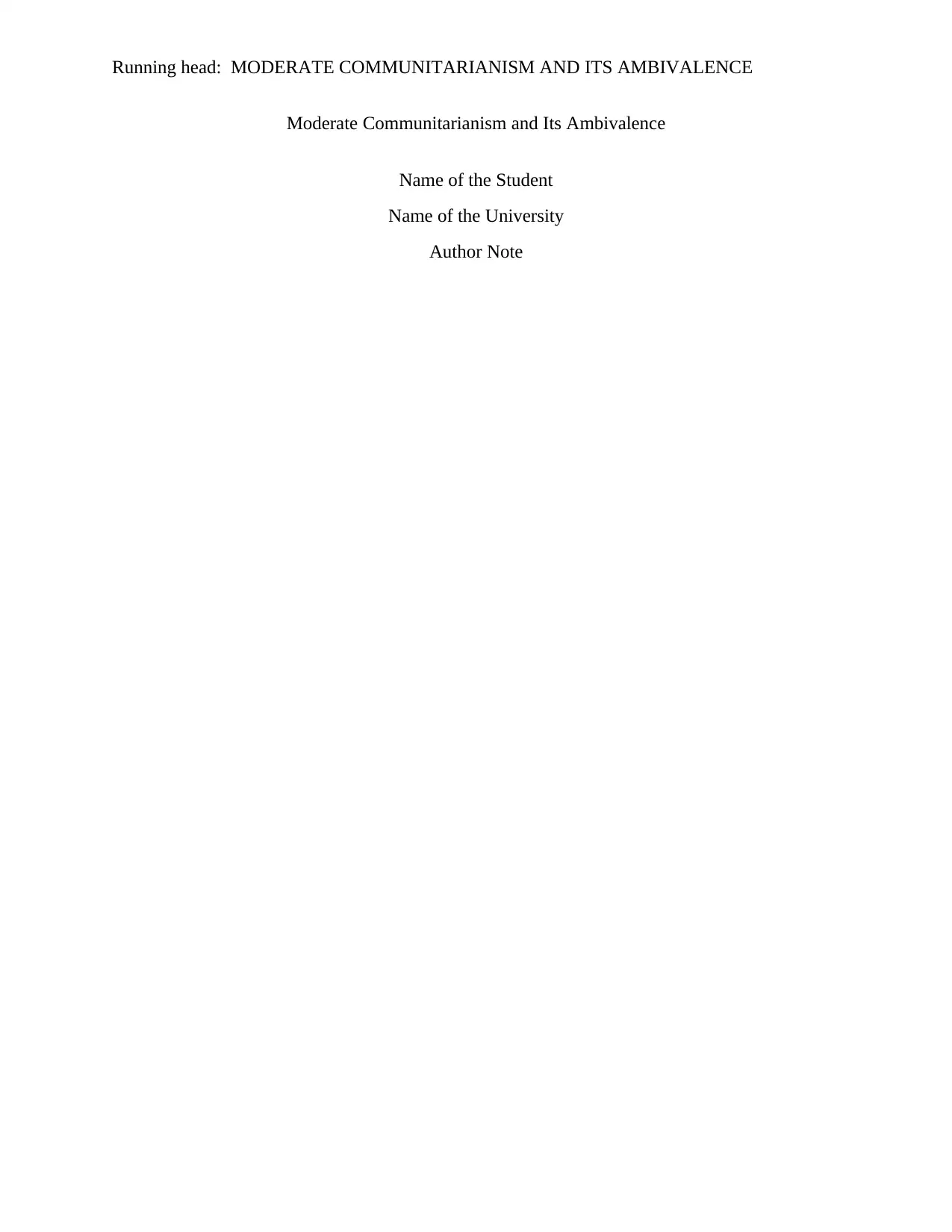
Running head: MODERATE COMMUNITARIANISM AND ITS AMBIVALENCE
Moderate Communitarianism and Its Ambivalence
Name of the Student
Name of the University
Author Note
Moderate Communitarianism and Its Ambivalence
Name of the Student
Name of the University
Author Note
Secure Best Marks with AI Grader
Need help grading? Try our AI Grader for instant feedback on your assignments.
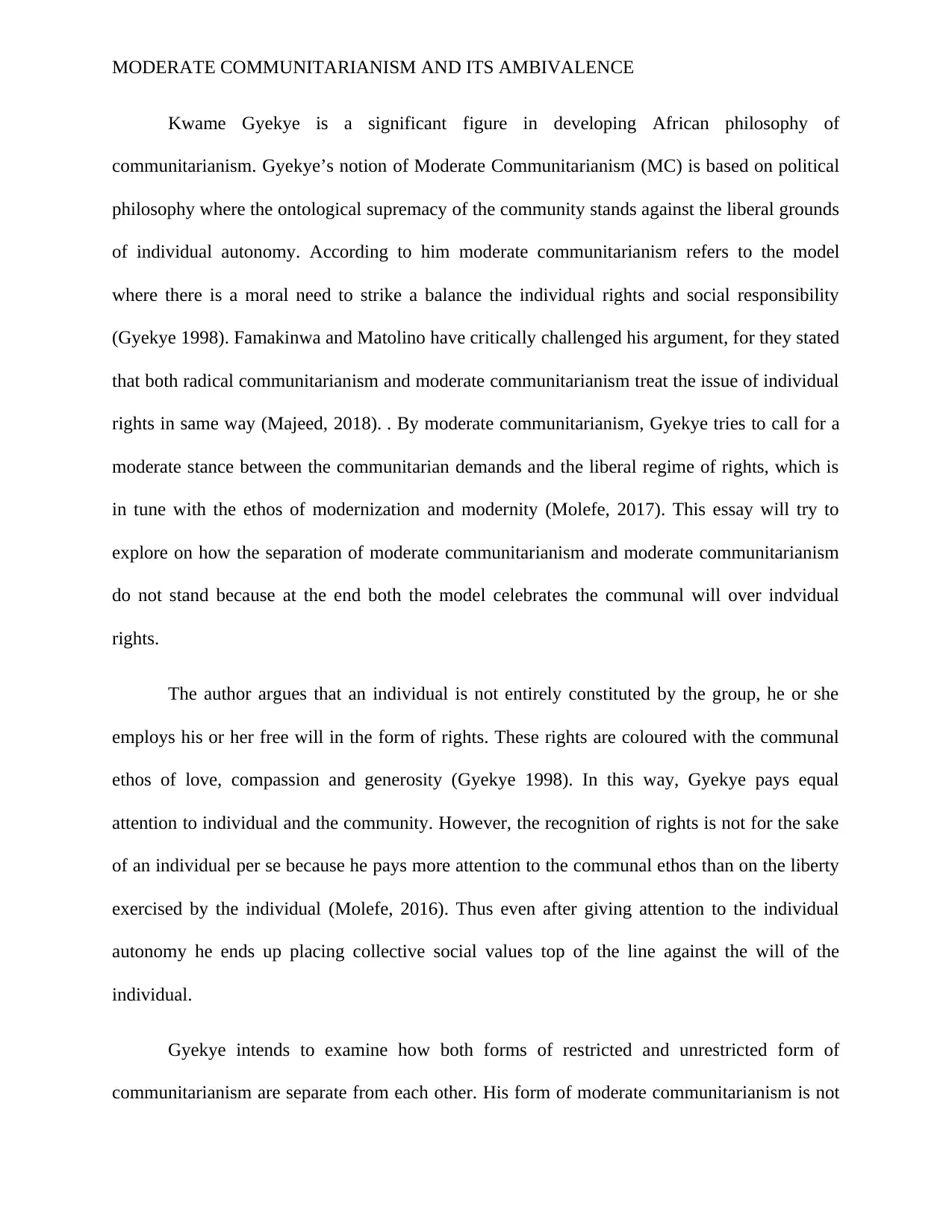
MODERATE COMMUNITARIANISM AND ITS AMBIVALENCE
Kwame Gyekye is a significant figure in developing African philosophy of
communitarianism. Gyekye’s notion of Moderate Communitarianism (MC) is based on political
philosophy where the ontological supremacy of the community stands against the liberal grounds
of individual autonomy. According to him moderate communitarianism refers to the model
where there is a moral need to strike a balance the individual rights and social responsibility
(Gyekye 1998). Famakinwa and Matolino have critically challenged his argument, for they stated
that both radical communitarianism and moderate communitarianism treat the issue of individual
rights in same way (Majeed, 2018). . By moderate communitarianism, Gyekye tries to call for a
moderate stance between the communitarian demands and the liberal regime of rights, which is
in tune with the ethos of modernization and modernity (Molefe, 2017). This essay will try to
explore on how the separation of moderate communitarianism and moderate communitarianism
do not stand because at the end both the model celebrates the communal will over indvidual
rights.
The author argues that an individual is not entirely constituted by the group, he or she
employs his or her free will in the form of rights. These rights are coloured with the communal
ethos of love, compassion and generosity (Gyekye 1998). In this way, Gyekye pays equal
attention to individual and the community. However, the recognition of rights is not for the sake
of an individual per se because he pays more attention to the communal ethos than on the liberty
exercised by the individual (Molefe, 2016). Thus even after giving attention to the individual
autonomy he ends up placing collective social values top of the line against the will of the
individual.
Gyekye intends to examine how both forms of restricted and unrestricted form of
communitarianism are separate from each other. His form of moderate communitarianism is not
Kwame Gyekye is a significant figure in developing African philosophy of
communitarianism. Gyekye’s notion of Moderate Communitarianism (MC) is based on political
philosophy where the ontological supremacy of the community stands against the liberal grounds
of individual autonomy. According to him moderate communitarianism refers to the model
where there is a moral need to strike a balance the individual rights and social responsibility
(Gyekye 1998). Famakinwa and Matolino have critically challenged his argument, for they stated
that both radical communitarianism and moderate communitarianism treat the issue of individual
rights in same way (Majeed, 2018). . By moderate communitarianism, Gyekye tries to call for a
moderate stance between the communitarian demands and the liberal regime of rights, which is
in tune with the ethos of modernization and modernity (Molefe, 2017). This essay will try to
explore on how the separation of moderate communitarianism and moderate communitarianism
do not stand because at the end both the model celebrates the communal will over indvidual
rights.
The author argues that an individual is not entirely constituted by the group, he or she
employs his or her free will in the form of rights. These rights are coloured with the communal
ethos of love, compassion and generosity (Gyekye 1998). In this way, Gyekye pays equal
attention to individual and the community. However, the recognition of rights is not for the sake
of an individual per se because he pays more attention to the communal ethos than on the liberty
exercised by the individual (Molefe, 2016). Thus even after giving attention to the individual
autonomy he ends up placing collective social values top of the line against the will of the
individual.
Gyekye intends to examine how both forms of restricted and unrestricted form of
communitarianism are separate from each other. His form of moderate communitarianism is not
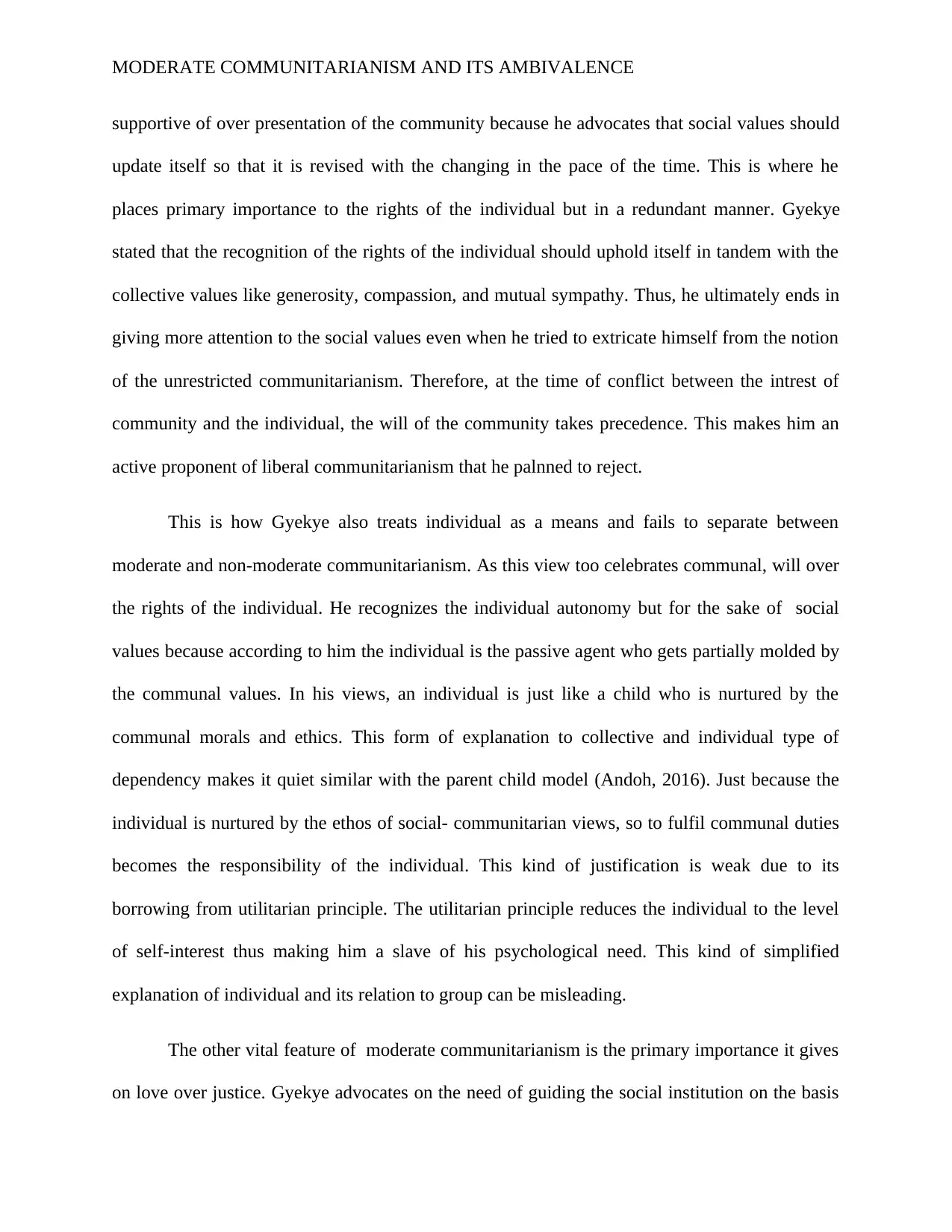
MODERATE COMMUNITARIANISM AND ITS AMBIVALENCE
supportive of over presentation of the community because he advocates that social values should
update itself so that it is revised with the changing in the pace of the time. This is where he
places primary importance to the rights of the individual but in a redundant manner. Gyekye
stated that the recognition of the rights of the individual should uphold itself in tandem with the
collective values like generosity, compassion, and mutual sympathy. Thus, he ultimately ends in
giving more attention to the social values even when he tried to extricate himself from the notion
of the unrestricted communitarianism. Therefore, at the time of conflict between the intrest of
community and the individual, the will of the community takes precedence. This makes him an
active proponent of liberal communitarianism that he palnned to reject.
This is how Gyekye also treats individual as a means and fails to separate between
moderate and non-moderate communitarianism. As this view too celebrates communal, will over
the rights of the individual. He recognizes the individual autonomy but for the sake of social
values because according to him the individual is the passive agent who gets partially molded by
the communal values. In his views, an individual is just like a child who is nurtured by the
communal morals and ethics. This form of explanation to collective and individual type of
dependency makes it quiet similar with the parent child model (Andoh, 2016). Just because the
individual is nurtured by the ethos of social- communitarian views, so to fulfil communal duties
becomes the responsibility of the individual. This kind of justification is weak due to its
borrowing from utilitarian principle. The utilitarian principle reduces the individual to the level
of self-interest thus making him a slave of his psychological need. This kind of simplified
explanation of individual and its relation to group can be misleading.
The other vital feature of moderate communitarianism is the primary importance it gives
on love over justice. Gyekye advocates on the need of guiding the social institution on the basis
supportive of over presentation of the community because he advocates that social values should
update itself so that it is revised with the changing in the pace of the time. This is where he
places primary importance to the rights of the individual but in a redundant manner. Gyekye
stated that the recognition of the rights of the individual should uphold itself in tandem with the
collective values like generosity, compassion, and mutual sympathy. Thus, he ultimately ends in
giving more attention to the social values even when he tried to extricate himself from the notion
of the unrestricted communitarianism. Therefore, at the time of conflict between the intrest of
community and the individual, the will of the community takes precedence. This makes him an
active proponent of liberal communitarianism that he palnned to reject.
This is how Gyekye also treats individual as a means and fails to separate between
moderate and non-moderate communitarianism. As this view too celebrates communal, will over
the rights of the individual. He recognizes the individual autonomy but for the sake of social
values because according to him the individual is the passive agent who gets partially molded by
the communal values. In his views, an individual is just like a child who is nurtured by the
communal morals and ethics. This form of explanation to collective and individual type of
dependency makes it quiet similar with the parent child model (Andoh, 2016). Just because the
individual is nurtured by the ethos of social- communitarian views, so to fulfil communal duties
becomes the responsibility of the individual. This kind of justification is weak due to its
borrowing from utilitarian principle. The utilitarian principle reduces the individual to the level
of self-interest thus making him a slave of his psychological need. This kind of simplified
explanation of individual and its relation to group can be misleading.
The other vital feature of moderate communitarianism is the primary importance it gives
on love over justice. Gyekye advocates on the need of guiding the social institution on the basis
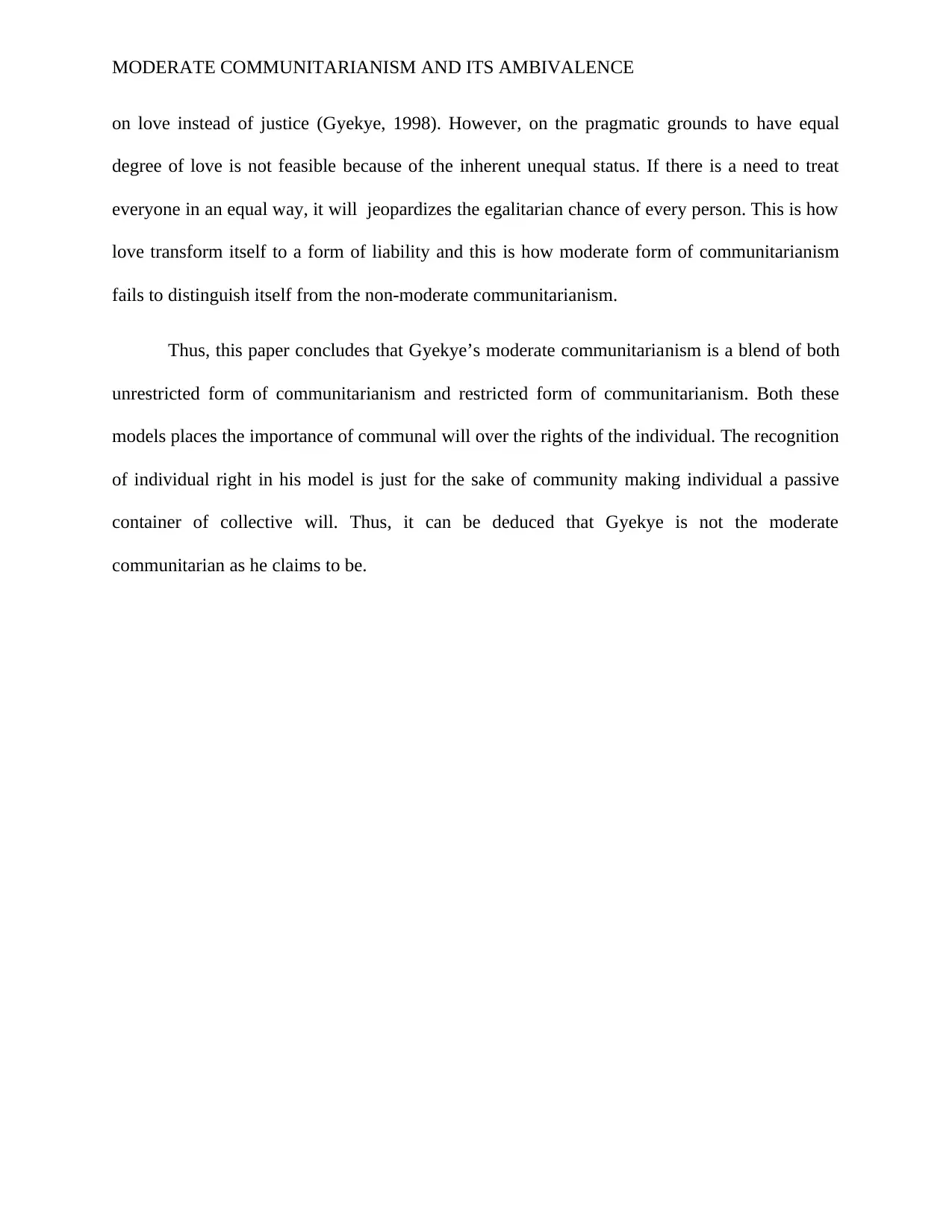
MODERATE COMMUNITARIANISM AND ITS AMBIVALENCE
on love instead of justice (Gyekye, 1998). However, on the pragmatic grounds to have equal
degree of love is not feasible because of the inherent unequal status. If there is a need to treat
everyone in an equal way, it will jeopardizes the egalitarian chance of every person. This is how
love transform itself to a form of liability and this is how moderate form of communitarianism
fails to distinguish itself from the non-moderate communitarianism.
Thus, this paper concludes that Gyekye’s moderate communitarianism is a blend of both
unrestricted form of communitarianism and restricted form of communitarianism. Both these
models places the importance of communal will over the rights of the individual. The recognition
of individual right in his model is just for the sake of community making individual a passive
container of collective will. Thus, it can be deduced that Gyekye is not the moderate
communitarian as he claims to be.
on love instead of justice (Gyekye, 1998). However, on the pragmatic grounds to have equal
degree of love is not feasible because of the inherent unequal status. If there is a need to treat
everyone in an equal way, it will jeopardizes the egalitarian chance of every person. This is how
love transform itself to a form of liability and this is how moderate form of communitarianism
fails to distinguish itself from the non-moderate communitarianism.
Thus, this paper concludes that Gyekye’s moderate communitarianism is a blend of both
unrestricted form of communitarianism and restricted form of communitarianism. Both these
models places the importance of communal will over the rights of the individual. The recognition
of individual right in his model is just for the sake of community making individual a passive
container of collective will. Thus, it can be deduced that Gyekye is not the moderate
communitarian as he claims to be.
Secure Best Marks with AI Grader
Need help grading? Try our AI Grader for instant feedback on your assignments.
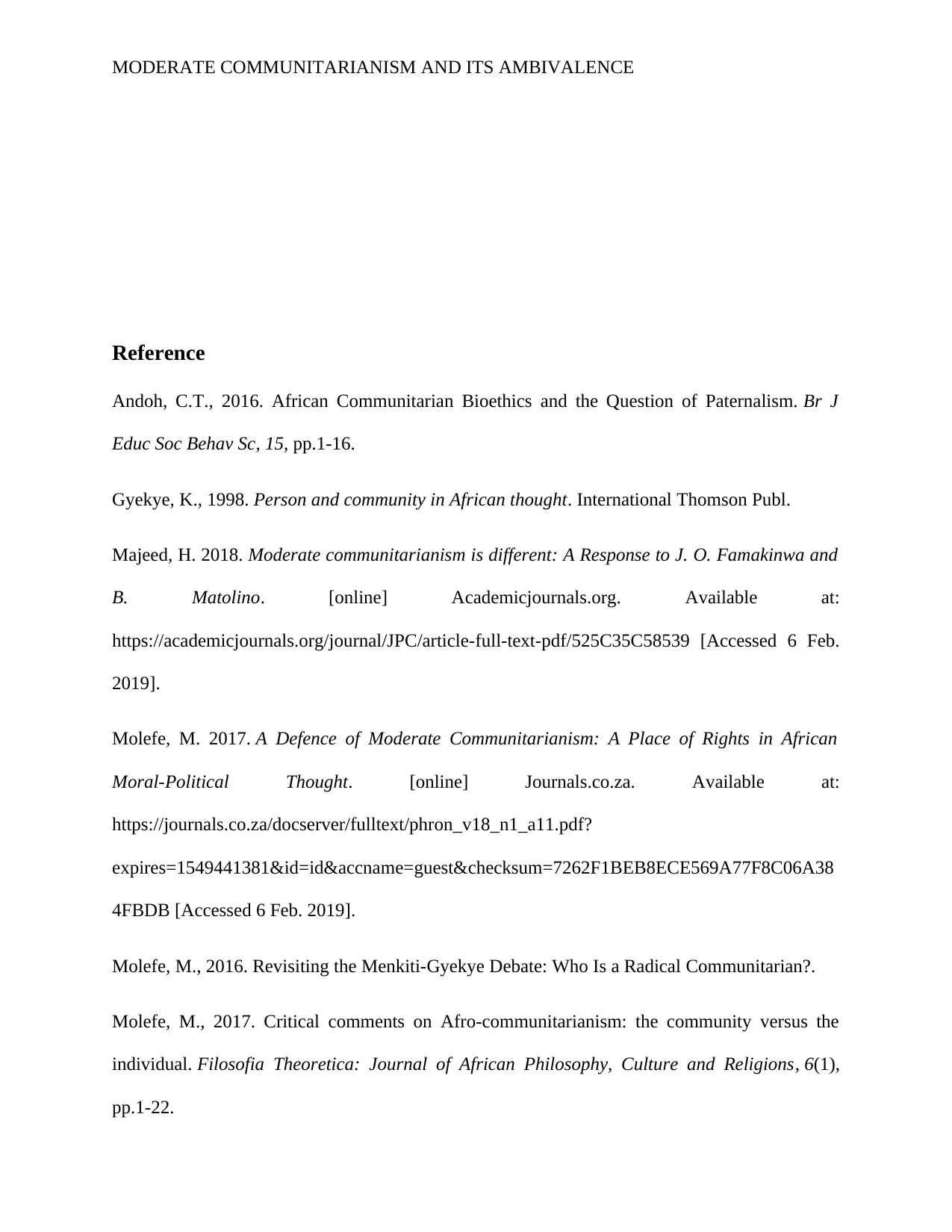
MODERATE COMMUNITARIANISM AND ITS AMBIVALENCE
Reference
Andoh, C.T., 2016. African Communitarian Bioethics and the Question of Paternalism. Br J
Educ Soc Behav Sc, 15, pp.1-16.
Gyekye, K., 1998. Person and community in African thought. International Thomson Publ.
Majeed, H. 2018. Moderate communitarianism is different: A Response to J. O. Famakinwa and
B. Matolino. [online] Academicjournals.org. Available at:
https://academicjournals.org/journal/JPC/article-full-text-pdf/525C35C58539 [Accessed 6 Feb.
2019].
Molefe, M. 2017. A Defence of Moderate Communitarianism: A Place of Rights in African
Moral-Political Thought. [online] Journals.co.za. Available at:
https://journals.co.za/docserver/fulltext/phron_v18_n1_a11.pdf?
expires=1549441381&id=id&accname=guest&checksum=7262F1BEB8ECE569A77F8C06A38
4FBDB [Accessed 6 Feb. 2019].
Molefe, M., 2016. Revisiting the Menkiti-Gyekye Debate: Who Is a Radical Communitarian?.
Molefe, M., 2017. Critical comments on Afro-communitarianism: the community versus the
individual. Filosofia Theoretica: Journal of African Philosophy, Culture and Religions, 6(1),
pp.1-22.
Reference
Andoh, C.T., 2016. African Communitarian Bioethics and the Question of Paternalism. Br J
Educ Soc Behav Sc, 15, pp.1-16.
Gyekye, K., 1998. Person and community in African thought. International Thomson Publ.
Majeed, H. 2018. Moderate communitarianism is different: A Response to J. O. Famakinwa and
B. Matolino. [online] Academicjournals.org. Available at:
https://academicjournals.org/journal/JPC/article-full-text-pdf/525C35C58539 [Accessed 6 Feb.
2019].
Molefe, M. 2017. A Defence of Moderate Communitarianism: A Place of Rights in African
Moral-Political Thought. [online] Journals.co.za. Available at:
https://journals.co.za/docserver/fulltext/phron_v18_n1_a11.pdf?
expires=1549441381&id=id&accname=guest&checksum=7262F1BEB8ECE569A77F8C06A38
4FBDB [Accessed 6 Feb. 2019].
Molefe, M., 2016. Revisiting the Menkiti-Gyekye Debate: Who Is a Radical Communitarian?.
Molefe, M., 2017. Critical comments on Afro-communitarianism: the community versus the
individual. Filosofia Theoretica: Journal of African Philosophy, Culture and Religions, 6(1),
pp.1-22.
1 out of 5
Your All-in-One AI-Powered Toolkit for Academic Success.
+13062052269
info@desklib.com
Available 24*7 on WhatsApp / Email
![[object Object]](/_next/static/media/star-bottom.7253800d.svg)
Unlock your academic potential
© 2024 | Zucol Services PVT LTD | All rights reserved.